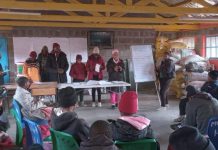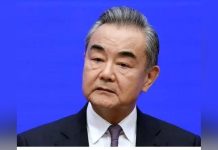Africa-Press – Lesotho. Agriculture modernisation is a comprehensive process of natural resources, economic development, population quality and institution.
This is according to Professor Wang Rui, speaking of Modernisation and wisdom of Chinese agricultural development effectiveness, development effectiveness, and development experiences.
Prof. Wang said socialised and commercial agriculture armed with modern industrial equipment, science and technology and management by modern organisation and management is a modern industry with strong competitiveness.
She said agricultural Modernisation is the process of transformation from traditional agriculture to modern agriculture, adding that using information technology and equipment technology promote traditional agriculture, change the development made and improve the level of agricultural Modernisation.
She also indicated that Modernisation of agriculture means equipping agriculture with modern industrial technology and equipment to realise mechanization, electrification, irrigation and gardening of agriculture.
“Modernization of agricultural production, technology, use modern science and technology to guide and equip agriculture such as breeding, cultivation and hybrid technology”, she said.
She also commented that agricultural machinery irrigation with intelligent technology is the core to achieve manual operation automation, noting that Modernisation of agriculture labourers is the ideological change of labourers including improvement of scientific, technological and cultural quality.
Prof. Wang further added that focus on key industries, gathers resource elements, extends the industrial chain and improves the supply chain, and enhances the value chain.
“Speeding up the construction of a modern industrial system with the cross integration of agriculture and secondary and tertiary industries improves production”, she commented.
Narrating the experience of China in agricultural Modernisation, the Professor indicated that agricultural Modernisation is comprehensive process of natural resources, and mentioned economic development, population quality and institution, further noting that proceeding from the reality of China’s vast agricultural territory, huge differences in the endowment of agricultural resources, large numbers of people and little land, shortage of agricultural resources, weak agricultural foundation and backward productivity and adapting to local conditions, multiple choices and joint efforts.
She noted that technological change, scientific and technological progress are the main power source of agricultural and rural development.
Further, she explained, 60 percent of China’s annual increase in grain production is supported by input of scientific and technology and modern factors, and technological progress is the only way forward for agriculture.
The purpose of modern agricultural production is to meet the needs of the market, Prof. Wang said.
“The market orientation is the power source for modern farmers to adapt to new technology and develop new agricultural functions”, she said.
Furthermore, she explained that agricultural Modernisation is a dynamic category and has different connotations in different development periods and stages, pointing out that there is need to proceed from the actual situation and push forward the construction of agricultural Modernisation in time, thus protecting the rights and interests of farmers and offering full pay to their enthusiasm, creativity and Principal roles, which are the fundamental guarantees for the realisation of agricultural Modernisation.
She concluded, by paying attention to the innovation of land system is the promise and foundation of developing modern agriculture and land system has a significant impact on agricultural productivity.
Dr. Yu Fengxia, on a similar platform said there is need to foster new quality, productive forces that can help achieve Modernisation.
She advised on focusing on digital economy as it is the most important aspect in production forces.
She cited that high quality development requires new theories of productive forces for guidance.
‘New quality productive forces have already taken shape in practice, demonstrating strong divine and supporting effects for high quality,” she commented.
The seminar is held in China, Beijing for over 13 African countries, discussing how Modernisation can enhance economic development.
For More News And Analysis About Lesotho Follow Africa-Press






